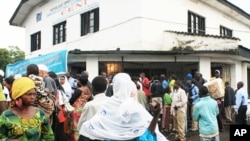On the last days of campaigning for the Democratic Republic of Congo’s second elections in more than 40 years, makeshift parades and campaign trucks circle Goma - the capital of North Kivu, one of the country’s most volatile provinces. And while throngs of people wait outside the electoral commission for new voting cards, many say they don’t think this region has the organizational skills to hold credible elections.
Less than a hundred people, mostly young men on motorcycles, shout and sing praise for their candidate in this mini-parade in one of Goma's dusty central round-abouts. They support opposition candidate Vital Kamerhe, one of the top three contenders for president, a race which includes current president Joseph Kabila.
Nationally, Etienne Tshisekedi is Kabila’s most formidable opponent. But in the east, he is not nearly as popular because of past associations with rebel groups. On Monday, voters will chose from 11 presidential candidates, and more than 1,800 parliamentary contenders.
But outside the regional election commission offices, voters wait for new registration cards for hours and hours, growing obviously restless and frustrated - another sign of organizational problems that threaten the credibility of these elections.
Cyprien Sumaili is an unemployed college graduate waiting to get a replacement card for the one he lost. He says even if he gets his card, he doesn’t think there are enough polling places to accommodate the voters of North Kivu.
Near where he speaks, a motorcycle driver passes out a few non-descript flyers from local aid workers. It is an open letter to the local electoral board, complaining that the elections are already marred. The letter says the process is already plagued by flawed poll lists and early signs of fraud. It warns that people in the east may reject the results- regardless of what happens.
Matthieu Ruchogoza heads the Goma office of the election board. When asked if he expects protests or post-election violence, he says he has no idea. He also declines comment on polls outside of North Kivu. But, he says, come Monday, the polling stations here will be open and ready to accommodate all of the provinces more than three million voters.
He says thousands of international observers, journalists, and witnesses from the Congo’s many political parties and aid organizations will oversee the elections, and that ballots, supplies and staff are prepared.
Opposition leaders claim the commission is not neutral- offering an edge to Kabila's party. But Ruchogoza says the board is an independent body without support for any party.
In the yard outside the commission, standing on the broken volcanic rock that characterizes much of this city, some would-be voters say they don’t think the hold-up is political. They say the chief of the commission promised them they will get a card and they are prepared to wait as long as it takes.
Jeremy, after almost five hours in the yard, with no end in sight, is asked if he thinks he will ever get his new voting card.
“Of course,” he said, smiling. “It is my right.”
Eastern Congo Sings, Struggles Ahead of Election Day








